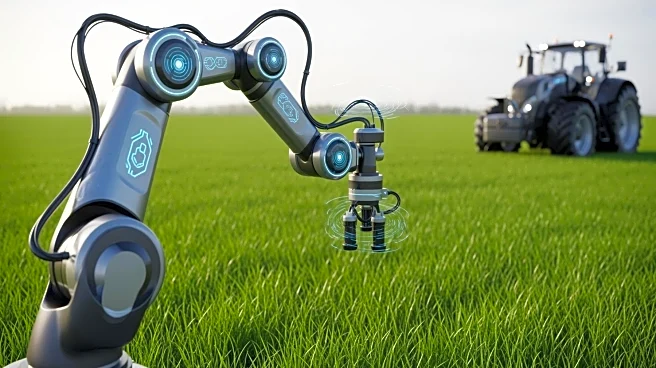What's Happening?
The agricultural equipment market is projected to grow significantly, reaching USD 301.81 billion by 2031, according to a report by Verified Market Research. This growth is driven by the increasing adoption of artificial intelligence (AI) and automation
technologies within the sector. AI is enhancing the efficiency and precision of agricultural machinery, enabling tasks such as soil analysis, targeted pesticide application, and crop monitoring to be performed autonomously. The integration of AI, GPS, and robotics is leading to a rise in precision farming techniques, which are becoming more prevalent as the industry shifts towards data-driven and sustainable practices. However, the market faces challenges, including a global semiconductor shortage that affects the production and affordability of AI-enabled equipment.
Why It's Important?
The expansion of the agricultural equipment market, fueled by AI and automation, has significant implications for the agricultural industry. The adoption of these technologies can lead to increased productivity and sustainability, addressing issues such as labor shortages and environmental concerns. This growth presents opportunities for companies involved in AI and robotics to expand their market presence. However, the challenges posed by supply chain disruptions and the need for substantial investment in infrastructure and training could hinder the adoption of these technologies, particularly for small-scale farmers. The market's growth could also influence global food production and security, as more efficient farming practices could lead to higher yields and reduced waste.
What's Next?
As the agricultural equipment market continues to grow, key players are likely to focus on overcoming the challenges associated with AI integration, such as the semiconductor shortage and the need for infrastructure investment. Companies may also explore strategies to make AI-enabled equipment more accessible to small-scale farmers. The market is expected to see further advancements in AI and automation technologies, which could lead to new product developments and innovations. Additionally, the industry may witness increased collaboration between technology providers and agricultural businesses to enhance the adoption of precision farming techniques.
Beyond the Headlines
The integration of AI in agriculture raises ethical and legal considerations, particularly regarding data privacy and the potential displacement of labor. As AI technologies become more prevalent, there may be a need for regulatory frameworks to ensure the responsible use of data and to address concerns about job losses in the agricultural sector. Furthermore, the shift towards AI-driven farming practices could lead to long-term changes in the agricultural landscape, influencing how food is produced and distributed globally.















